Fearghal McGarry (born 16 November 1971) is an Irish historian specializing in the history of Ireland in the 20th century, currently Professor of Modern Irish History at Queen's University, Belfast.
McGarry is the author of books about Ireland in the first half of the twentieth century. He is a member of the Royal Irish Academy. [1]
McGarry was educated at University College Dublin and Trinity College Dublin, where he graduated in modern history. [2]
McGarry was a lecturer in Irish History at Trinity College Dublin, and later a Government of Ireland research fellow at the National University of Ireland, Maynooth. From there, he became Senior Lecturer in History at Queen's University, Belfast, before appointment as Professor of Modern Irish History in the School of History, Anthropology, Philosophy and Politics. [2] [3]
He was joint editor of Irish Historical Studies and a member of the editorial board of Proceedings of the Royal Irish Academy (Section C). He is currently a member of the advisory group for the Ulster Museum's project Collecting the Troubles and Beyond. [2]
McGarry is the author of a number of books on Irish history in the twentieth century, including studies of Frank Ryan (2002), Eoin O'Duffy (2005), and the Easter Rising (2010). Most of his recent work is published by the Oxford University Press.
McGarry is a member of the Royal Irish Academy and in February 2021 was chosen as the Boston College Burns Visiting Scholar and gave the Burns Lecture on 31 March: Communism, Sex and All That Jazz: The Struggle Against Modernity in Interwar Ireland. With fellow academics from the University of Edinburgh and Boston College, he leads a research project funded by the Arts and Humanities Research Council, A Global History of Irish Revolution 1916-1923, which includes museum exhibitions and special issues of Irish Historical Studies and History Ireland , together with a book to be published by New York University Press. The project concluded with an international conference at Boston College in September 2021. [4]

The Easter Rising, also known as the Easter Rebellion, was an armed insurrection in Ireland during Easter Week in April 1916. The Rising was launched by Irish republicans against British rule in Ireland with the aim of establishing an independent Irish Republic while the United Kingdom was fighting the First World War. It was the most significant uprising in Ireland since the rebellion of 1798 and the first armed conflict of the Irish revolutionary period. Sixteen of the Rising's leaders were executed starting in May 1916. The nature of the executions, and subsequent political developments, ultimately contributed to an increase in popular support for Irish independence.

Eoin O'Duffy was an Irish military commander, police commissioner and fascist leader. O'Duffy was the leader of the Monaghan Brigade of the Irish Republican Army (IRA) and a prominent figure in the Ulster IRA during the Irish War of Independence. In this capacity, he became Chief of Staff of the IRA in 1922. He accepted the Anglo-Irish Treaty and as a general became Chief of Staff of the National Army in the Irish Civil War, on the pro-Treaty side.

Kevin Christopher O'Higgins was an Irish politician who served as Vice-President of the Executive Council and Minister for Justice from 1922 to 1927, Minister for External Affairs from June 1927 to July 1927 and Minister for Economic Affairs from January 1922 to September 1922. He served as a Teachta Dála (TD) from 1918 to 1927.
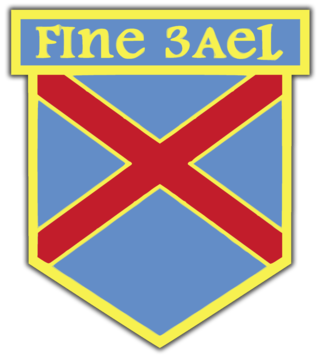
The Army Comrades Association (ACA), later the National Guard, then Young Ireland and finally League of Youth, but best known by the nickname the Blueshirts, was a paramilitary organisation in the Irish Free State, founded as the Army Comrades Association in Dublin on 9 February 1932. The group provided physical protection for political groups such as Cumann na nGaedheal from intimidation and attacks by the IRA. Some former members went on to fight for the Nationalists in the Spanish Civil War after the group had been dissolved.

Eoin MacNeill was an Irish scholar, Irish language enthusiast, Gaelic revivalist, nationalist and politician who served as Minister for Education from 1922 to 1925, Ceann Comhairle of Dáil Éireann from 1921 to 1922, Minister for Industries 1919 to 1921 and Minister for Finance January 1919 to April 1919. He served as a Teachta Dála (TD) from 1918 to 1927. He was a Member of Parliament (MP) for Londonderry City from 1918 to 1922 and a Member of the Northern Ireland Parliament (MP) for Londonderry from 1921 to 1925.

The Irish Volunteers, also known as the Irish Volunteer Force or the Irish Volunteer Army, was a paramilitary organisation established in 1913 by nationalists and republicans in Ireland. It was ostensibly formed in response to the formation of its Irish unionist/loyalist counterpart the Ulster Volunteers in 1912, and its declared primary aim was "to secure and maintain the rights and liberties common to the whole people of Ireland". Its ranks included members of the Conradh na Gaeilge, Ancient Order of Hibernians, Sinn Féin and the Irish Republican Brotherhood. Increasing rapidly to a strength of nearly 200,000 by mid-1914, it split in September of that year over John Redmond's support for the British war effort during World War I, with the smaller group opposed to Redmond's decision retaining the name "Irish Volunteers".
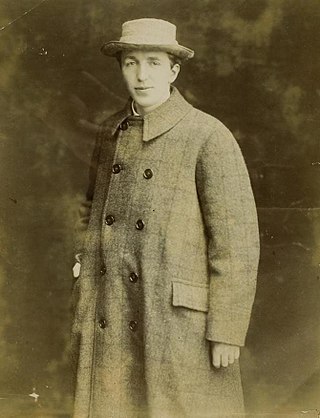
John Bulmer Hobson was an Irish republican. He was a leading member of the Irish Volunteers and the Irish Republican Brotherhood (IRB) before the Easter Rising in 1916. Hobson swore Patrick Pearse into membership of the IRB in late 1913. He opposed and attempted to prevent the Easter Rising. Hobson was also chief of staff of Fianna Éireann, which he helped to found.
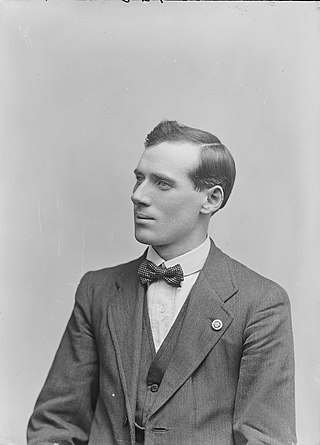
Michael Joseph Staines was an Irish republican, politician and police commissioner. He was born in Newport, County Mayo, his mother Margaret's home village, and where his father Edward was serving as a Royal Irish Constabulary (RIC) officer.

The Irish Brigade fought on the Nationalist side of Francisco Franco during the Spanish Civil War. The unit was formed wholly of Roman Catholics by the politician Eoin O'Duffy, who had previously organised the banned quasi-fascist Blueshirts and openly fascist Greenshirts in Ireland. Despite the declaration by the Irish government that participation in the war was unwelcome and ill-advised, 700 of O'Duffy's followers went to Spain. They saw their primary role in Spain as fighting for the Roman Catholic Church against the Red Terror of Spanish anticlericalists. They also saw many religious and historical parallels in the two nations, and hoped to prevent communism gaining ground in Spain.
Córas na Poblachta was a minor Irish republican political party founded in 1940.

Gearóid O'Sullivan was an Irish teacher, Irish language scholar, army officer, barrister and Sinn Féin and Fine Gael politician.

Patrick Belton was an Irish nationalist, politician, farmer, and businessman. Closely associated with Michael Collins, he was active in the 1916 Easter Rising and in the Republican movement in the years that followed. Belton later provided a strong Catholic voice in an Irish nationalist context throughout his career. He was strongly anti-communist and he was a founder and leader of the Irish Christian Front. Supportive of Francisco Franco, Belton however opposed Eoin O'Duffy taking an Irish Brigade to Spain, feeling that they would be needed in Ireland to counter domestic "political ills".
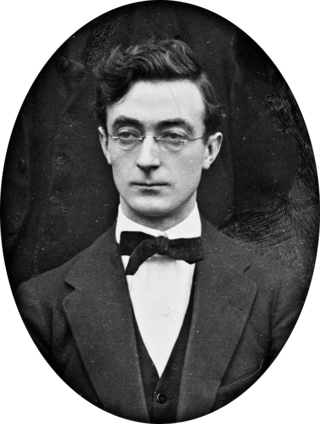
Seán McGarry was a 20th-century Irish nationalist and politician. A longtime senior member of the Irish Republican Brotherhood (IRB), he served as its president from May 1917 until May 1918 when he was one of a number of nationalist leaders arrested for his alleged involvement in the so-called German Plot.
Bloody Sunday or Belfast's Bloody Sunday was a day of violence in Belfast, Northern Ireland on 10 July 1921, during the Irish War of Independence. The violence erupted one day before a truce began, which ended the war in most of Ireland. With the truce nearing, police launched a raid against republicans, but were ambushed by the Irish Republican Army (IRA) and an officer was killed. In retaliation, Protestant loyalists attacked Catholic enclaves in west Belfast, burning homes and businesses. This sparked rioting and gun battles between Protestants and Catholics, including paramilitaries. There were also gun battles between republicans/nationalists and the police, and some police patrols fired indiscriminately at Catholic civilians. Seventeen people were killed or fatally wounded on 10 July, and a further three were killed or fatally wounded before the truce began at noon on 11 July. At least 100 people were wounded. About 200 houses were destroyed or badly damaged, most of them Catholic homes, leaving 1,000 people homeless. See: The Troubles in Northern Ireland (1920–1922).
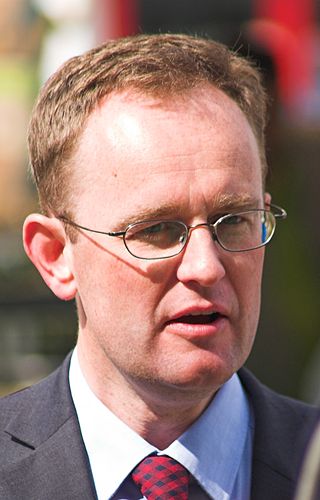
Professor Richard Sean Grayson is a British historian. He is currently the Head of School of Education, Humanities and Languages at Oxford Brookes University.

Lieutenant-General Daniel Hogan was Chief of Staff of the Defence Forces in Ireland from March 1927 to February 1929.
Eimar Ultan O'Duffy was born in Dublin and educated at Belvedere College in Dublin, Stonyhurst College in Lancashire and at University College Dublin.
Elizabeth Bloxham was an Irish feminist and suffragist, serving as the national organizer for Cumann na mBan in the lead up to the 1916 Easter Rising and up through the Irish War of Independence.
Brian O'Neill was an English, Irish, or American journalist and Communist activist who worked mostly in London and Dublin between the 1920s and the 1970s.
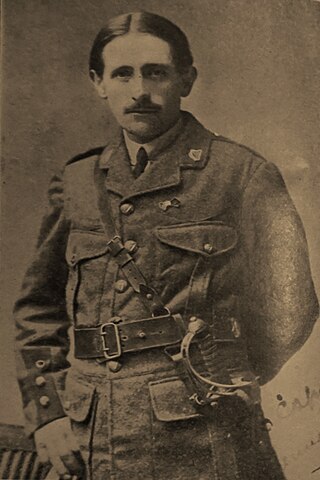
William James Brennan-Whitmore was an Irish revolutionary, journalist and soldier. Joining the Irish Volunteers during the Home Rule Crisis, Brennan-Whitmore took part in the Easter Rising, Irish War of Independence and Irish Civil War, before becoming in later years an advocate of corporatism and fascism.